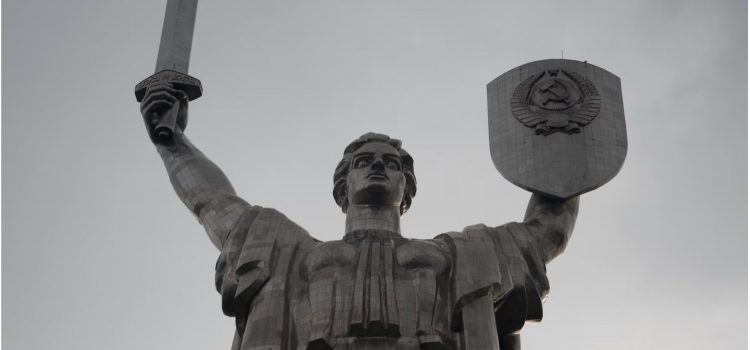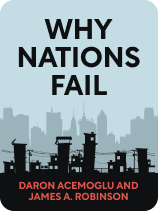

This article is an excerpt from the Shortform book guide to "Why Nations Fail" by Daron Acemoglu and James A. Robinson. Shortform has the world's best summaries and analyses of books you should be reading.
Like this article? Sign up for a free trial here.
Why do nations fail? Why do some countries succeed? What factors determine success or failure?
Why Nations Fail by economist Daron Acemoglu and political scientist James A. Robinson creates a theory to explain international inequality. Their book explains why some nations “fail” and are poor, unstable, and have low standards of living, while others “succeed” and are wealthy and stable.
Keep reading to learn why some nations fail while others enjoy success, according to Acemoglu and Robinson.
Why Do Nations Fail?
Acemoglu and Robinson published Why Nations Fail in 2012, when the global political landscape looked much different than it did just a few years later. The book was published in the middle of the Arab Spring, a series of pro-democracy protests in Middle Eastern and North African nations like Tunisia, Libya, and Egypt. In its 2012 report, nonprofit Freedom House classified 87 nations as “free,” 60 nations as “partly free,” and 48 nations as “not free.” This is the context in which Acemoglu and Robinson wrote Why Nations Fail—a book that argues that liberal democracy is the most stable and economically viable form of government.
In the years since the book’s release, there’s been a trend of authoritarian nations growing more powerful and democracies becoming partially, or entirely, authoritarian. In its 2022 report, Freedom House classified 83 nations as “free,” 56 nations as “partially free,” and 56 nations as “not free.” At the same time, there is increasing interest in the subject of why nations fail. Unlike Acemoglu and Robinson’s book, though, more recent works exploring this subject—such as How Democracies Die—tend to focus on the instability of liberal democracy and how nations become authoritarian.
Acemoglu & Robinson Explain
In addition to describing nations that succeed through openness, Acemoglu and Robinson also explore nations that “fail,” or that are poor and unstable with low quality of life. According to the authors, the answer to the question “Why do nations fail?” is due to political and economic institutions that are “exclusive” rather than open. These exclusive institutions enrich and empower a select group of elites at the expense of the population at large. In Part 3 of our guide, we’ll explain Acemoglu and Robinson’s arguments on what makes institutions exclusive, why exclusive institutions cause nations to fail, and why many leaders create exclusive institutions.
(Shortform note: Some scholars suggest that authoritarian (and therefore exclusive) regimes will sometimes empower themselves by benefitting the population at large. Though these regimes still repress dissent, they may not fully meet Acemoglu and Robinson’s definition of “failing”: widespread poverty and low quality of life. From this perspective, exclusive leaders will provide wealth, benefits, or quality of life improvements to the population at large to coerce them into submission. For example, while Fidel Castro’s Cuba both repressed dissent and faced major economic hardships, it also created one of the world’s best healthcare systems.)
Exclusive Political Institutions
Acemoglu and Robinson explain that for a political institution to be exclusive, it must meet one of the following two standards:
1) Non-pluralistic: Unlike pluralistic institutions described above, non-pluralistic institutions don’t allow the population at large to exercise political power and don’t create limits on government power. Therefore, non-pluralistic institutions are exclusive by definition: They empower a few elites (the government and wealthy individuals) at the expense of the population at large, who can’t exercise political power or hold their government accountable.
2) Lack of enforcement: Even if a nation has pluralistic institutions, it can still be exclusive if it doesn’t have the power to enforce basic rules of conduct on the elite. Without this power, there’s nothing to limit government power or hold politicians accountable. In this situation, those in power can simply ignore the rules at the expense of the people—meaning that, in practical terms, the nation has exclusive political institutions.
| Liberal Democracy and the Question of Singapore Proponents of liberal democracy (a government consisting of open political institutions) have long debated the success of Singapore and what it means. Even using Acemoglu and Robinson’s standards for exclusive political institutions—specifically their standards for pluralism—Singapore doesn’t neatly fit into the category of either exclusive or open: 1) Exclusivity: Singaporeans elect government representatives, though most argue that these elections aren’t particularly fair—the dominant political party controls election rules and consistently wins a vast majority of elections. In addition, laws limit free speech, public assembly, and LGBTQ rights. These factors suggest that the Singaporean government isn’t pluralistic.The dominant party has the power to change or ignore limits on its power, and the population at large lacks a great deal of political power. That being said, the one-party hold on legislative, judicial, and executive authority also means that Singapore does have respected central power. 2) Openness: At the same time, Singapore is generally ranked as having one of the freest and most open economies in the world. The government generally supports a free and fair market by enforcing strong property rights and offering opportunities for entrepreneurship, as well as freedom of movement and employment. Singapore therefore presents a challenge to Acemoglu and Robinson’s theory of why nations fail—that exclusive political institutions necessarily lead to large-scale exploitation and failure. |
Exclusive Economic Institutions
Under exclusive political institutions, those in power are free to create exclusive economic institutions that benefit themselves and their allies at the expense of everyone else. These exclusive economic institutions limit the economic activity of citizens by controlling what jobs they can have, what businesses they can run, and what technologies they can use or develop. This ensures that all market activity benefits those in power.
For example, Ellen lives in a nation with exclusive economic institutions and tries to start a business. To start her business, though, she has to bribe a government official, take out a high-interest loan from a state-run bank, and prove that she won’t sell anything “subversive.” These steps ensure that Ellen’s business benefits those in power first and foremost.
(Shortform note: Acemoglu and Robinson focus on how exclusive economic institutions serve leaders or high-ranking officials, but many scholars suggest that in corrupt (and exclusive) nations, these institutions benefit those in power on every level of society. At the lower levels of society, those in power aren’t dictators or their inner circle, but rather police officers, city governments, and other low-level bureaucrats. The presence of low-level corruption (bribery, nepotism, graft, and so on) shows how exclusive economic institutions don’t just benefit those at the very top—they can also benefit lower-level corrupt officials.)
Why Exclusive Institutions Lead to Failure
Acemoglu and Robinson argue that exclusive institutions cause nations to fail for two main reasons:
1) Lack of technological development: Exclusive institutions prevent and discourage citizens from developing new technology, limiting access to the skills, resources, and opportunities necessary for citizens to develop new ideas. This is largely because exclusive leaders fear technological developments that could lead to major economic or social changes—changes that could destabilize their hold on power. The result is that an intelligent and creative citizen in an exclusive nation won’t have access to a technical education, won’t be able to choose their own career in science or technology, won’t have access to a lab or research team, and won’t be allowed to create or distribute any new ideas that might threaten the state.
2) No incentives for productivity: Citizens have no reason to work hard, create wealth, or start a business if their government can arbitrarily take everything they earn or imprison them.
(Shortform note: Acemoglu and Robinson focus on how exclusive institutions fail by limiting a nation’s internal development—how they hamper the creation of wealth by limiting technology and productivity. In The White Man’s Burden, William Easterly argues that exclusive institutions also limit external economic development: They discourage wealth or business from coming into the nation through international trade. Corruption, bribery, and extortion are common in exclusive institutions and also discourage trade from foreign nations or businesses—it’s bad business for them to work with someone that might rip them off.)
Why Exclusive Economies Grow (and Decline)
While the authors believe that exclusive nations will eventually fail, they acknowledge that exclusive nations can undergo economic growth by exploiting a particularly valuable industry or by expanding their use of existing technology. However, Acemoglu and Robinson argue that exclusive economies can’t grow sustainably.
This is because exclusive institutions prevent “creative destruction”: technological development that creates new industries and destroys old ones. Acemoglu and Robinson argue that creative destruction constitutes healthy economic progress because it allows more efficient and productive industries to replace wasteful and outdated ones. This allows society to adapt to change and create more wealth over time. For instance, the growth of online shopping led to the destruction of many retail chains. This is the result of nations adapting to change (the popularization of the internet) and adopting a more efficient industry—one that delivers more goods for lower prices, benefiting everyone.
(Shortform note: Many critics of Acemoglu and Robinson, including Bill Gates, take particular issue with the idea that exclusivity leads to decline—either immediately or in the near future. Gates argues that all economic growth will inevitably decline regardless of openness or exclusivity. He cites the Great Depression and the 2008 financial crisis as examples of this.These events caused global economic decline separate from increases in exclusivity. Ultimately, Gates argues that openness and exclusivity aren’t sufficient for predicting or explaining a nation’s economic fortunes.)
Because they limit technological development and productivity, exclusive nations can’t adapt to creative destruction and therefore will eventually decline. An example of this is the collapse of the Venezuelan economy in the 2010s. Venezuela is an exclusive nation run by a dictator, but it still found economic success by exploiting oil reserves. However, the Venezuelan economy was entirely dependent on this existing industry. This meant that when the price of oil dropped in the 2010s, the Venezuelan economy couldn’t adapt and fell apart entirely.
(Shortform note: In the decade since Acemoglu and Robinson wrote Why Nations Fail, some exclusive nations have tried to embrace economic and technological development to avoid decline. For example, oil-rich and exclusive nations Saudi Arabia and the United Arab Emirates have launched massive campaigns to diversify their economies and reduce their dependence on oil. These efforts pose potential challenges to Acemoglu and Robinson’s argument that exclusive nations inevitably decline and can’t adapt to new developments—though it remains to be seen how successful they’ll be.)
Why Leaders Create Exclusive Institutions
The authors explain that leaders don’t create exclusive institutions for purely economic reasons—they create them to maintain their hold on power. These leaders aren’t trying to decide what’s economically best, but instead are trying to protect their own political position. This explains why leaders might make decisions completely contrary to economic wisdom or that have disastrous economic results and can lead nations to fail. For example, a leader might sabotage a major corporation with tariffs not because they think that’ll help the economy, but because the CEO of that corporation is a potential political rival.
(Shortform note: Creating or enforcing exclusive institutions isn’t always a question of a greedy government official vying for money or power—sometimes, it’s a matter of staying alive. Take, for example, the relationship between low-level Mexican bureaucrats and drug cartels. Police officers, small-town mayors, and business owners often work with (or at least ignore) the cartels—which terrorize and exploit the population—due to the cartels’ threats of violence against these very same public officials. While this may or may not justify these officials’ corruption, it does show that “maintaining a hold on power” is sometimes more about avoiding political violence than it is about self-enrichment.)

———End of Preview———
Like what you just read? Read the rest of the world's best book summary and analysis of Daron Acemoglu and James A. Robinson's "Why Nations Fail" at Shortform.
Here's what you'll find in our full Why Nations Fail summary:
- Why some nations have wealth while others struggle with poverty
- Why open nations thrive and exclusive nations typically fail
- How and why some nations change over time






